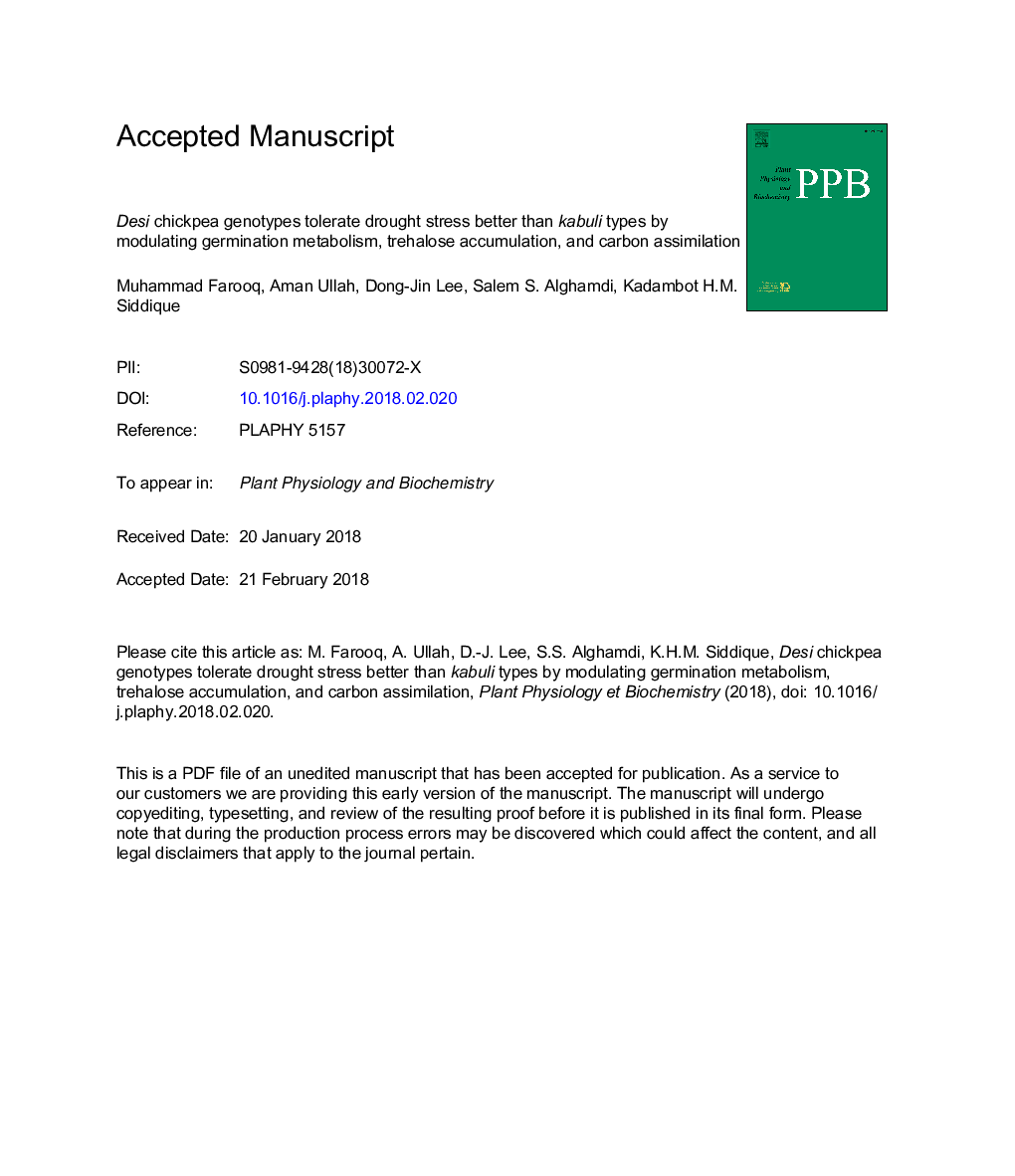| کد مقاله | کد نشریه | سال انتشار | مقاله انگلیسی | نسخه تمام متن |
|---|---|---|---|---|
| 8353010 | 1541895 | 2018 | 23 صفحه PDF | دانلود رایگان |
عنوان انگلیسی مقاله ISI
Desi chickpea genotypes tolerate drought stress better than kabuli types by modulating germination metabolism, trehalose accumulation, and carbon assimilation
ترجمه فارسی عنوان
ژنوتیپ نخود فرنگی، تنش خشکی را بهتر از انواع کابولی تحمل می کند، با تغییر متابولیسم جوانه زنی، تجمع تر هالوز و جذب کربن
دانلود مقاله + سفارش ترجمه
دانلود مقاله ISI انگلیسی
رایگان برای ایرانیان
کلمات کلیدی
ą-آمیلاز، نخود، خشکی، فتوسنتز، ترهالوز،
موضوعات مرتبط
علوم زیستی و بیوفناوری
علوم کشاورزی و بیولوژیک
دانش گیاه شناسی
چکیده انگلیسی
Chickpea is mostly grown in rainfed environments and, consequently, its growth is affected by drought stress. This study comprised two independent experiments to investigate the physiological basis of drought tolerance in desi and kabuli chickpea genotypes. In Experiment 1, six genotypes each of desi and kabuli types were planted in soil-filled pots under natural conditions. Ten days after planting, soil moisture was maintained at 75% water holding capacity (well-watered) or 50% water holding capacity (drought stress). Drought stress significantly reduced seedling dry weight, specific leaf area (SLA), and transpiration efficiency (TE) in both chickpea types, relative to the well-watered controls, but their responses varied, with relatively fewer reductions in desi genotypes, Bakhar-2011 and Bitall-2016, and kabuli genotypes, K-70005 and Noor-2013. These four genotypes were used in experiment 2, which was similar to the first but conducted in a climate chamber and the drought was imposed at planting. Drought stress reduced stand establishment, growth, photosynthesis, water relations, α-amylase activity, sugar metabolism, proline, phenolic accumulation, nitrogen and potassium to varying degrees in the four tested genotypes. The reductions were greater in kabuli genotypes than desi genotypes. Under drought stress, desi genotypes germinated better, and had higher trehalose, total and reducing sugars, sucrose, α-amylase activity, photosynthesis, growth, and mineral concentrations than kabuli genotypes. The desi genotype Bakhar-2011 performed better under drought than the desi genotype Bitall-2016 due to better germination metabolism and accumulation of free proline, total phenolics, and trehalose, which maintained carbon assimilation and prevented oxidative damage. In conclusion, desi chickpea types tolerate drought stress better than kabuli types due to better germination metabolism and trehalose accumulation, which prevented oxidative damage, helped with efficient water use, and sustained plant growth.
ناشر
Database: Elsevier - ScienceDirect (ساینس دایرکت)
Journal: Plant Physiology and Biochemistry - Volume 126, May 2018, Pages 47-54
Journal: Plant Physiology and Biochemistry - Volume 126, May 2018, Pages 47-54
نویسندگان
Muhammad Farooq, Aman Ullah, Dong-Jin Lee, Salem S. Alghamdi, Kadambot H.M. Siddique,
